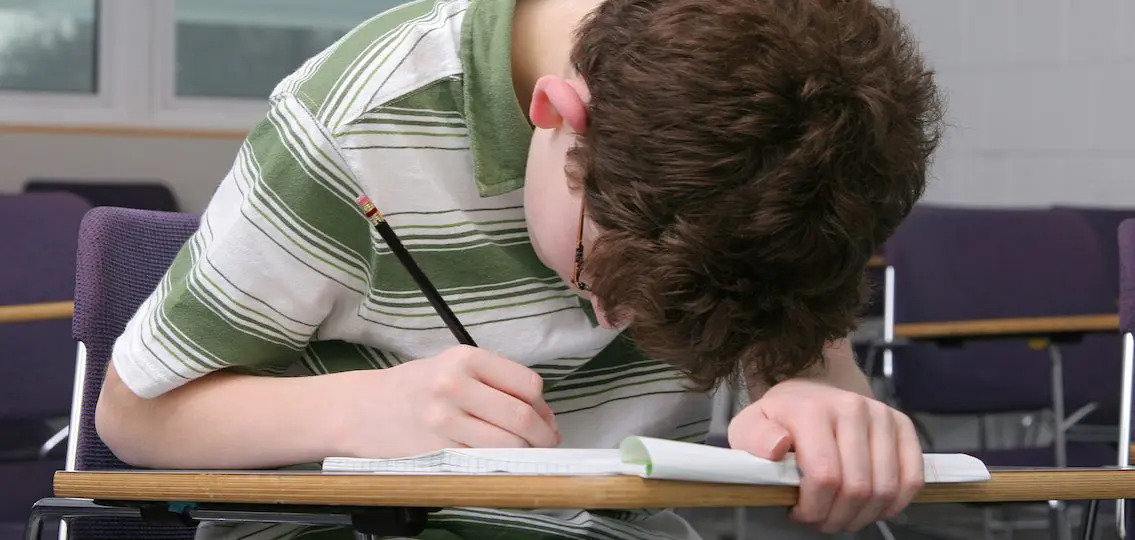Life is stressful and busy, and kids grow up so fast that we can all easily miss early warning signs of situations—like undiagnosed dyslexia—where a child needs extra help.
My wife and I certainly did.
Even though I have dyslexia myself, I never really understood it, so when our son was born, we didn’t know what to watch for during his early years. To complicate matters, symptoms of dyslexia can be subtle and older children with undiagnosed dyslexia become very good at hiding their difficulties.

Signs of Undiagnosed Dyslexia in Teens
Children with undiagnosed dyslexia cannot figure out why they can’t learn to read and write like their peers, and this causes them tremendous frustration. If they have dyslexia and it hasn’t been recognized and accommodated by the time they’re a tween or teen, their frustration can cause them to act out in ways that are increasingly attention-getting. These behaviors are a cry for help and can include any of the following:
1. Avoidance
Kids who struggle to read and write will do just about anything to avoid situations where those tasks are required. You may find that your child is skipping class, taking unnecessary trips to the bathroom or school nurse, failing to turn in homework, oversleeping or showing other resistance strategies to getting ready in the morning, while expressing an ardent dislike of school in general.
2. Anxiety and depression
Kids with dyslexia are at high risk for anxiety, depression, and feelings of hopelessness. Every school day, they face humiliation, failure, and a constant dread that they will be “outed.” For a dyslexic, that means being asked to read aloud, answer essay questions, write a paper, or perform some task that will reveal their deficits to the teacher, or even worse, their peers.
Since dyslexia and anxiety or depression go hand in hand, it’s important to be on the lookout. Signs of anxiety and depression can include changes in sleep patterns, changes in appetite or body weight, anger, frustration, isolating themselves, escaping reality through excessive use of electronic devices or gaming, and an inability to enjoy activities that had been enjoyable in the past. If unrecognized and untreated, anxiety and depression can lead to thoughts of suicide, since the child knows no other way out of their situation. Artwork, social media posts, and music and entertainment choices can be a window into their thoughts.
3. Drugs and alcohol
Kids who feel hopeless and broken will try to escape those feelings as often as possible, and so are at high risk for early experimentation with drugs and alcohol. It’s not uncommon for a dyslexic to have discovered the escape or “relief” of substances by the third or fourth grade, and for those substance uses to go unnoticed by parents for several years.
An anxious, depressed young person will find ways to soothe themselves, and while their desire to feel less anxious is normal and healthy, it is the way the child goes about it that is harmful. If a child is already using nicotine, alcohol, or other drugs, one of the most helpful things parents can do is to recognize the reasons for their child’s self-medicating habits and offer support in finding other options for understanding and managing their anxieties.
4. Violence
A child who feels powerless in one aspect of their life can seek other ways to feel powerful. When children fear that they’re stupid, lazy, or have a broken brain, they can conclude that there’s nothing they can do to change the situation. This causes anger. Constant educational demands combined with feeling like they are struggling alone with no solution in sigh can create overwhelming feelings of anger and injustice. Lashing out violently, particularly toward classmates who have mocked or teased them, is a way of taking back power.

It’s Not Hopeless
If you notice your child exhibiting some, or all, of these behaviors, consider the possibility that the frustrations resulting from undiagnosed dyslexia may be a contributing factor. A dyslexia diagnosis requires testing by an educational specialist, a pediatric psychiatrist, or a neurologist, but every child with dyslexia can be helped. No matter where your child is educationally or emotionally, it’s never too late to pursue a course of action that will offer them the support they need.




